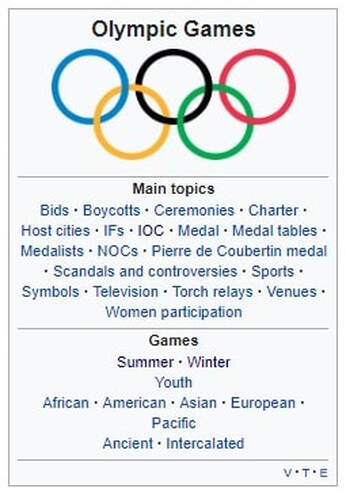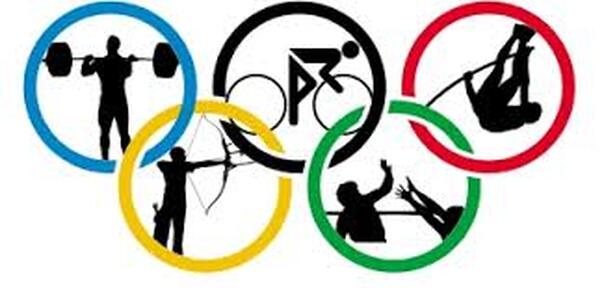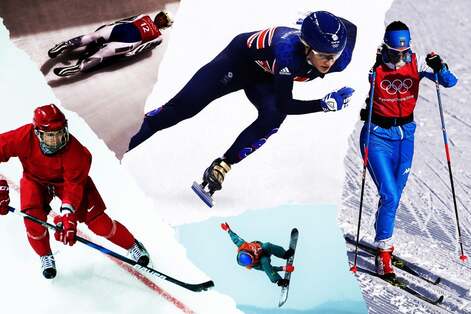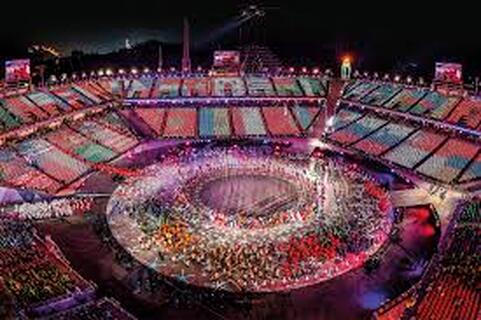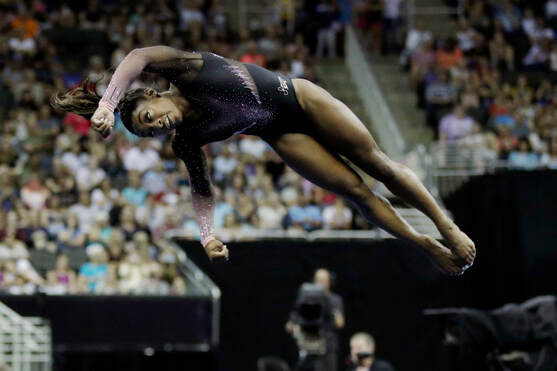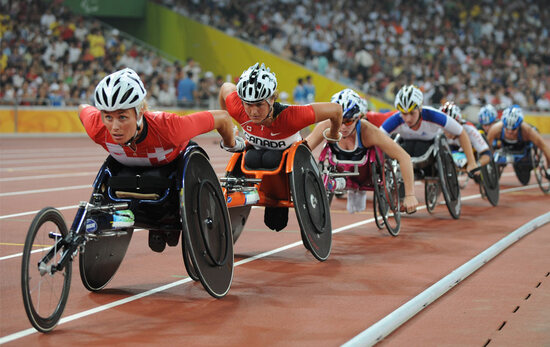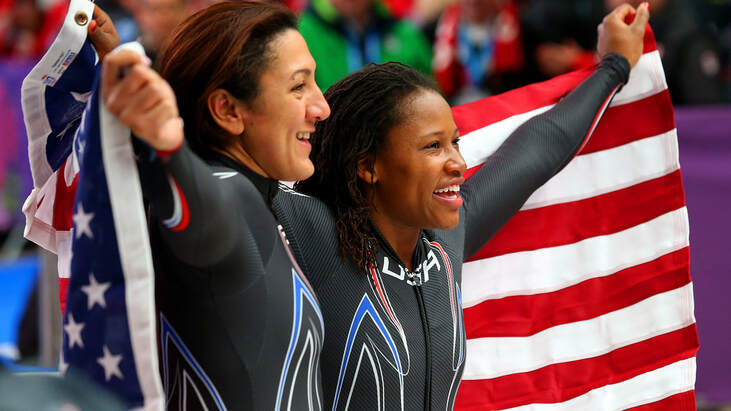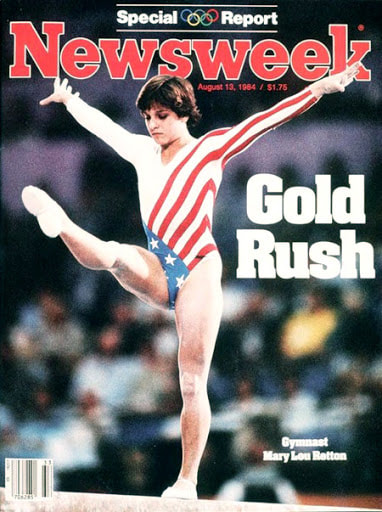Copyright © 2015 Bert N. Langford (Images may be subject to copyright. Please send feedback)
Welcome to Our Generation USA!
Herein we will Cover the
Summer and Winter Olympics,
including the Paralympics
Olympic GamesPictured below: the Olympics symbol and the events and other topics to be covered on this Web Page
The modern Olympic Games or Olympics are leading international sporting events featuring summer and winter sports competitions in which thousands of athletes from around the world participate in a variety of competitions.
The Olympic Games are considered the world's foremost sports competition with more than 200 nations participating. The Olympic Games are normally held every four years, alternating between the Summer and Winter Games every two years in the four-year period.
Their creation was inspired by the ancient Olympic Games (Ancient Greek: Ὀλυμπιακοί Ἀγῶνες), which were held in Olympia, Greece, from the 8th century BC to the 4th century AD.
Baron Pierre de Coubertin founded the International Olympic Committee (IOC) in 1894, leading to the first modern Games in Athens in 1896. The IOC is the governing body of the Olympic Movement, with the Olympic Charter defining its structure and authority.
The evolution of the Olympic Movement during the 20th and 21st centuries has resulted in several changes to the Olympic Games. Some of these adjustments include:
The Deaflympics and Special Olympics are also endorsed by the IOC. The IOC has had to adapt to a variety of economic, political, and technological advancements. The abuse of amateur rules by the Eastern Bloc nations prompted the IOC to shift away from pure amateurism, as envisioned by Coubertin, to allowing participation of professional athletes.
The growing importance of mass media created the issue of corporate sponsorship and commercialisation of the Games. World wars led to the cancellation of the 1916, 1940, and 1944 Games. Large-scale boycotts during the Cold War limited participation in the 1980 and 1984 Games, and the 2020 Games were postponed to 2021 due to the COVID-19 pandemic.
The Olympic Movement consists of international sports federations (IFs), National Olympic Committees (NOCs), and organizing committees for each specific Olympic Games. As the decision-making body, the IOC is responsible for choosing the host city for each Games, and organizes and funds the Games according to the Olympic Charter.
The IOC also determines the Olympic program, consisting of the sports to be contested at the Games. There are several Olympic rituals and symbols, such as the Olympic flag and torch, as well as the opening and closing ceremonies.
Over 14,000 athletes competed at the 2016 Summer Olympics and 2018 Winter Olympics combined, in 35 different sports and over 400 events. The first, second, and third-place finishers in each event receive Olympic medals: gold, silver, and bronze, respectively.
The Games have grown so much that nearly every nation is now represented. This growth has created numerous challenges and controversies, including boycotts, doping, bribery, and a terrorist attack in 1972. Every two years the Olympics and its media exposure provide athletes with the chance to attain national and sometimes international fame.
The Games also constitute an opportunity for the host city and country to showcase themselves to the world.
Click on any of the following blue hyperlinks for more about the Olympic Games:
The Olympic Games are considered the world's foremost sports competition with more than 200 nations participating. The Olympic Games are normally held every four years, alternating between the Summer and Winter Games every two years in the four-year period.
Their creation was inspired by the ancient Olympic Games (Ancient Greek: Ὀλυμπιακοί Ἀγῶνες), which were held in Olympia, Greece, from the 8th century BC to the 4th century AD.
Baron Pierre de Coubertin founded the International Olympic Committee (IOC) in 1894, leading to the first modern Games in Athens in 1896. The IOC is the governing body of the Olympic Movement, with the Olympic Charter defining its structure and authority.
The evolution of the Olympic Movement during the 20th and 21st centuries has resulted in several changes to the Olympic Games. Some of these adjustments include:
- the creation of the Winter Olympic Games for snow and ice sports,
- the Paralympic Games for athletes with a disability,
- the Youth Olympic Games for athletes aged 14 to 18,
- the five Continental games (Pan American, African, Asian, European, and Pacific),
- and the World Games for sports that are not contested in the Olympic Games.
The Deaflympics and Special Olympics are also endorsed by the IOC. The IOC has had to adapt to a variety of economic, political, and technological advancements. The abuse of amateur rules by the Eastern Bloc nations prompted the IOC to shift away from pure amateurism, as envisioned by Coubertin, to allowing participation of professional athletes.
The growing importance of mass media created the issue of corporate sponsorship and commercialisation of the Games. World wars led to the cancellation of the 1916, 1940, and 1944 Games. Large-scale boycotts during the Cold War limited participation in the 1980 and 1984 Games, and the 2020 Games were postponed to 2021 due to the COVID-19 pandemic.
The Olympic Movement consists of international sports federations (IFs), National Olympic Committees (NOCs), and organizing committees for each specific Olympic Games. As the decision-making body, the IOC is responsible for choosing the host city for each Games, and organizes and funds the Games according to the Olympic Charter.
The IOC also determines the Olympic program, consisting of the sports to be contested at the Games. There are several Olympic rituals and symbols, such as the Olympic flag and torch, as well as the opening and closing ceremonies.
Over 14,000 athletes competed at the 2016 Summer Olympics and 2018 Winter Olympics combined, in 35 different sports and over 400 events. The first, second, and third-place finishers in each event receive Olympic medals: gold, silver, and bronze, respectively.
The Games have grown so much that nearly every nation is now represented. This growth has created numerous challenges and controversies, including boycotts, doping, bribery, and a terrorist attack in 1972. Every two years the Olympics and its media exposure provide athletes with the chance to attain national and sometimes international fame.
The Games also constitute an opportunity for the host city and country to showcase themselves to the world.
Click on any of the following blue hyperlinks for more about the Olympic Games:
- Ancient Olympics
- Modern Games
- International Olympic Committee
- Commercialization
- Symbols
- Ceremonies
- Sports
- Controversies
- Citizenship
- Champions and medallists
- Nations
- See also:
- Official website
- "Olympic Games". Encyclopædia Britannica Online.
- Olympic Games at Curlie
- New York Times Interactive of all the medals in the Modern Olympics
- insidethegames – the latest and most up to date news and interviews from the world of Olympic, Commonwealth and Paralympic Games
- ATR – Around the Rings – the Business Surrounding the Olympics
- GamesBids.com – An Authoritative Review of Olympic Bid Business (home of the BidIndex™)
- Database Olympics
- History of Olympics to the Present Day
- Reference book about all Olympic Medalists of all times
- Days left until the next Olympic Games | The Olympic Games Countdown | 2012 | Sochi 2014 | Rio 2016 | PyeongChang 2018 | Tokyo 2020
- Olympic and Asian games records
- All-time Olympic Games medal table
- Art competitions at the Summer Olympics
- List of multi-sport events
- Olympic Cup and Olympic Order
- Olympic Day Run
- Pierre de Coubertin medal
- SportAccord
Summer Olympic Games
- YouTube Video of the Best of the 2016 Rio Summer Olympic Games
- YouTube Video: The Most Beautiful Moment of Rio 2016 | Fair Play
- YouTube Video: The Photo-Finish of One of the Biggest Olympic Rivalries | Olympics On The Record
The Summer Olympic Games (or the Games of the Olympiad, first held in 1896, is a major international multi-sport event normally held once every four years. The most recent Summer Olympics were held in Rio de Janeiro, Brazil.
The International Olympic Committee (IOC) organises the Games and oversees the host city's preparations. In each Olympic event, gold medals are awarded for first place, silver medals are awarded for second place, and bronze medals are awarded for third place; this tradition began in 1904. The Winter Olympic Games were created out of the success of the Summer Olympics.
The Olympics have increased in scope from a 42 competition event programme with fewer than 250 male competitors from 14 nations in 1896, to 306 events with 11,238 competitors (6,179 men, 5,059 women) from 206 nations in 2016.
The Summer Olympics has been hosted on five continents by a total of nineteen countries.
The Games have been held:
The IOC has selected Tokyo, Japan, for a second time, to host the 2020 Summer Olympics (due to take place in 2021).
The 2024 Summer Olympics will be held in Paris, France, for a third time, exactly one hundred years after the city's last Summer Olympics in 1924. The IOC has also selected Los Angeles, California, to host its third Summer Games in 2028.
Only five countries have participated in every Summer Olympic Games – Australia, France, Great Britain, Greece, and Switzerland.
The United States leads the all-time medal table for the Summer Olympics.
Click on any of the following blue hyperlinks for more about the Summer Olympics:
The International Olympic Committee (IOC) organises the Games and oversees the host city's preparations. In each Olympic event, gold medals are awarded for first place, silver medals are awarded for second place, and bronze medals are awarded for third place; this tradition began in 1904. The Winter Olympic Games were created out of the success of the Summer Olympics.
The Olympics have increased in scope from a 42 competition event programme with fewer than 250 male competitors from 14 nations in 1896, to 306 events with 11,238 competitors (6,179 men, 5,059 women) from 206 nations in 2016.
The Summer Olympics has been hosted on five continents by a total of nineteen countries.
The Games have been held:
- four times in the United States (1904, 1932, 1984, and 1996),
- three times in Great Britain (1908, 1948, and 2012),
- twice each
- and once each
The IOC has selected Tokyo, Japan, for a second time, to host the 2020 Summer Olympics (due to take place in 2021).
The 2024 Summer Olympics will be held in Paris, France, for a third time, exactly one hundred years after the city's last Summer Olympics in 1924. The IOC has also selected Los Angeles, California, to host its third Summer Games in 2028.
Only five countries have participated in every Summer Olympic Games – Australia, France, Great Britain, Greece, and Switzerland.
The United States leads the all-time medal table for the Summer Olympics.
Click on any of the following blue hyperlinks for more about the Summer Olympics:
Winter Olympic Games
- YouTube Video: Top 10 Surprise Finishes of All Time at the Winter Olympics
- YouTube Video: Top 5 Winter Olympic Moments! | 50 Greatest Moments Of The Olympic Winter Games
- YouTube Video: Aljona Savchenko and Bruno Massot (GER) - Gold Medal | Pairs Free Skating | PyeongChang 2018
The Winter Olympic Games is a major international multi-sport event held once every four years for sports practiced on snow and ice.
The first Winter Olympic Games, the 1924 Winter Olympics, were held in Chamonix, France. The modern Olympic Games were inspired by the ancient Olympic Games, which were held in Olympia, Greece, from the 8th century BC to the 4th century AD.
Baron Pierre de Coubertin founded the International Olympic Committee (IOC) in 1894, leading to the first modern Summer Olympic Games in Athens, Greece in 1896. The IOC is the governing body of the Olympic Movement, with the Olympic Charter defining its structure and authority.
The original five Winter Olympic sports (broken into nine disciplines) were:
The Games were held every four years from 1924 to 1936, interrupted in 1940 and 1944 by World War II, and resumed in 1948.
Until 1992, the Summer Olympic Games and the Winter Olympic Games were held in the same year, and in accordance with the 1986 decision by the IOC to place the Summer Olympic Games and the Winter Olympic Games on separate four-year cycles in alternating even-numbered years, the next Winter Olympic Games after 1992 were held in 1994.
The Winter Olympic Games have evolved since their inception. Sports and disciplines have been added and some of them, such as Alpine skiing, luge, short track speed skating, freestyle skiing, skeleton, and snowboarding, have earned a permanent spot on the Olympic program.
Some others, including curling and bobsleigh, have been discontinued and later reintroduced; others have been permanently discontinued, such as military patrol, though the modern Winter Olympic sport of biathlon is descended from it. Still others, such as speed skiing, bandy and skijoring, were demonstration sports but never incorporated as Olympic sports.
The rise of television as a global medium for communication enhanced the profile of the Games. It generated income via the sale of broadcast rights and advertising, which has become lucrative for the IOC. This allowed outside interests, such as television companies and corporate sponsors, to exert influence.
The IOC has had to address numerous criticisms over the decades like internal scandals, the use of performance-enhancing drugs by Winter Olympians, as well as a political boycott of the Winter Olympic Games. Countries have used the Winter Olympic Games as well as the Summer Olympic Games to proclaim the superiority of their political systems.
The Winter Olympic Games have been hosted on three continents by twelve different countries. They have been held:
Also, the Winter Olympic Games have been held just once each in:
The IOC has selected Beijing, China, to host the 2022 Winter Olympics and the Italian cities of Milan and Cortina d'Ampezzo to host the 2026 Winter Olympics.
As of 2018, no city in the Southern Hemisphere has applied to host the cold-weather-dependent Winter Olympic Games, which are held in February at the height of the Southern Hemisphere's summer.
To date, twelve countries have participated in every Winter Olympic Games – Austria, Canada, Finland, France, Great Britain, Hungary, Italy, Norway, Poland, Sweden, Switzerland and the United States.
Six of these countries have won medals at every Winter Olympic Games – Austria, Canada, Finland, Norway, Sweden, and the United States. The only country to have won a gold medal at every Winter Olympic Games is the United States. Norway leads the all-time Olympic Games medal table for Winter Olympic Games. When including defunct states, Germany (including the former countries of West Germany and East Germany) leads, followed by Norway and Russia (including the former Soviet Union).
Click on any of the following blue hyperlinks for more about the Winter Olympics:
The first Winter Olympic Games, the 1924 Winter Olympics, were held in Chamonix, France. The modern Olympic Games were inspired by the ancient Olympic Games, which were held in Olympia, Greece, from the 8th century BC to the 4th century AD.
Baron Pierre de Coubertin founded the International Olympic Committee (IOC) in 1894, leading to the first modern Summer Olympic Games in Athens, Greece in 1896. The IOC is the governing body of the Olympic Movement, with the Olympic Charter defining its structure and authority.
The original five Winter Olympic sports (broken into nine disciplines) were:
- bobsleigh,
- curling,
- ice hockey,
- Nordic skiing (consisting of the disciplines military patrol, cross-country skiing, Nordic combined, and ski jumping),
- and skating (consisting of the disciplines figure skating and speed skating).
The Games were held every four years from 1924 to 1936, interrupted in 1940 and 1944 by World War II, and resumed in 1948.
Until 1992, the Summer Olympic Games and the Winter Olympic Games were held in the same year, and in accordance with the 1986 decision by the IOC to place the Summer Olympic Games and the Winter Olympic Games on separate four-year cycles in alternating even-numbered years, the next Winter Olympic Games after 1992 were held in 1994.
The Winter Olympic Games have evolved since their inception. Sports and disciplines have been added and some of them, such as Alpine skiing, luge, short track speed skating, freestyle skiing, skeleton, and snowboarding, have earned a permanent spot on the Olympic program.
Some others, including curling and bobsleigh, have been discontinued and later reintroduced; others have been permanently discontinued, such as military patrol, though the modern Winter Olympic sport of biathlon is descended from it. Still others, such as speed skiing, bandy and skijoring, were demonstration sports but never incorporated as Olympic sports.
The rise of television as a global medium for communication enhanced the profile of the Games. It generated income via the sale of broadcast rights and advertising, which has become lucrative for the IOC. This allowed outside interests, such as television companies and corporate sponsors, to exert influence.
The IOC has had to address numerous criticisms over the decades like internal scandals, the use of performance-enhancing drugs by Winter Olympians, as well as a political boycott of the Winter Olympic Games. Countries have used the Winter Olympic Games as well as the Summer Olympic Games to proclaim the superiority of their political systems.
The Winter Olympic Games have been hosted on three continents by twelve different countries. They have been held:
- four times in the United States (1932, 1960, 1980, and 2002),
- three times in France (1924, 1968, and 1992)
- and twice each:
Also, the Winter Olympic Games have been held just once each in:
- Germany (1936),
- Yugoslavia (1984),
- Russia (2014),
- and South Korea (2018).
The IOC has selected Beijing, China, to host the 2022 Winter Olympics and the Italian cities of Milan and Cortina d'Ampezzo to host the 2026 Winter Olympics.
As of 2018, no city in the Southern Hemisphere has applied to host the cold-weather-dependent Winter Olympic Games, which are held in February at the height of the Southern Hemisphere's summer.
To date, twelve countries have participated in every Winter Olympic Games – Austria, Canada, Finland, France, Great Britain, Hungary, Italy, Norway, Poland, Sweden, Switzerland and the United States.
Six of these countries have won medals at every Winter Olympic Games – Austria, Canada, Finland, Norway, Sweden, and the United States. The only country to have won a gold medal at every Winter Olympic Games is the United States. Norway leads the all-time Olympic Games medal table for Winter Olympic Games. When including defunct states, Germany (including the former countries of West Germany and East Germany) leads, followed by Norway and Russia (including the former Soviet Union).
Click on any of the following blue hyperlinks for more about the Winter Olympics:
International Olympic Committee
Pictured below: The IOC is a not-for-profit independent international organisation made up of volunteers. The IOC President presides over all its activities, while the IOC Session and Executive Board are responsible for taking the main decisions for the organisation.
- YouTube Video: International Olympic Committee holds a briefing amid concerns over coronavirus | USA TODAY
- YouTube Video: World Health Organization and International Olympic Committee give press conference
- YouTube Video: Tonya Harding Scandal*: Top 5 Facts You Should Know
Pictured below: The IOC is a not-for-profit independent international organisation made up of volunteers. The IOC President presides over all its activities, while the IOC Session and Executive Board are responsible for taking the main decisions for the organisation.
The International Olympic Committee (IOC; French: Comité international olympique, CIO) is a non-governmental sports organisation based in Lausanne, Switzerland.
Founded by Pierre de Coubertin and Demetrios Vikelas in 1894, it is the authority responsible for organising the modern Summer and Winter Olympic Games.
The IOC is the governing body of the National Olympic Committees (NOCs), which are the national constituents of the worldwide Olympic Movement. As of 2016, there are 206 NOCs officially recognised by the IOC. The current president of the IOC is Thomas Bach of Germany, who succeeded Jacques Rogge of Belgium in September 2013.
Mission and roles:
Further information: Olympic Charter
The stated mission of the IOC is to promote the Olympics throughout the world and to lead the Olympic Movement:
Click on any of the following blue hyperlinks for more about the International Olympic Committee (IOC):
Founded by Pierre de Coubertin and Demetrios Vikelas in 1894, it is the authority responsible for organising the modern Summer and Winter Olympic Games.
The IOC is the governing body of the National Olympic Committees (NOCs), which are the national constituents of the worldwide Olympic Movement. As of 2016, there are 206 NOCs officially recognised by the IOC. The current president of the IOC is Thomas Bach of Germany, who succeeded Jacques Rogge of Belgium in September 2013.
Mission and roles:
Further information: Olympic Charter
The stated mission of the IOC is to promote the Olympics throughout the world and to lead the Olympic Movement:
- To encourage and support the organisation, development and coordination of sport and sports competitions;
- To ensure the regular celebration of the Olympic Games;
- To cooperate with the competent public or private organisations and authorities in the endeavour to place sport at the service of humanity and thereby to promote peace;
- To act against any form of discrimination affecting the Olympic Movement;
- To encourage and support the promotion of women in sport at all levels and in all structures with a view to implementing the principle of equality of men and women.
Click on any of the following blue hyperlinks for more about the International Olympic Committee (IOC):
- History
- IOC Executive Board
- IOC Commissions
- Organization
- Honours
- IOC members
- Olympic marketing
- The Olympic Partner programme
- Environmental concerns
- Controversies
- See also:
- Official website
- Association of International Olympic Winter Sports Federations (AIOWF)
- Association of IOC Recognised International Sports Federations (ARISF)
- Association of Summer Olympic International Federations (ASOIF)
- Deaflympics
- International Academy of Sport Science and Technology (AISTS)
- International Committee of Sports for the Deaf (ICSD)
- International Paralympic Committee
- SportAccord
- FICTS (Fédération Internationale Cinéma Télévision Sportifs) (Organisation recognised by the IOC)
- Media related to International Olympic Committee at Wikimedia Commons
- Olympics on Twitter
Jesse Owens
YouTube Video of Jesse Owens winning 100m Olympic Gold in front of Hitler at 1936 Olympics
YouTube Video of Jesse Owens winning 100m Olympic Gold in front of Hitler at 1936 Olympics
James Cleveland "Jesse" Owens (September 12, 1913 – March 31, 1980) was an American track and field athlete and four-time Olympic gold medalist in the 1936 Games.
Owens specialized in the sprints and the long jump and was recognized in his lifetime as "perhaps the greatest and most famous athlete in track and field history". His achievement of setting three world records and tying another in less than an hour at the 1935 Big Ten track meet in Ann Arbor, Michigan, has been called "the greatest 45 minutes ever in sport" and has never been equaled.
At the 1936 Summer Olympics in Berlin, Germany, Owens won international fame with four gold medals: 100 meters, 200 meters, long jump, and 4 × 100 meter relay. He was the most successful athlete at the Games and, as a black man, was credited with "single-handedly crushing Hitler's myth of Aryan supremacy", although he "wasn't invited to the White House to shake hands with the President, either".
The Jesse Owens Award is USA Track and Field's highest accolade for the year's best track and field athlete. Owens was ranked by ESPN as the sixth greatest North American athlete of the twentieth century and the highest-ranked in his sport. In 1999 he was on the six man short list for the BBC's Sports Personality of the Century.
For more about Jesse Owens, click here.
Owens specialized in the sprints and the long jump and was recognized in his lifetime as "perhaps the greatest and most famous athlete in track and field history". His achievement of setting three world records and tying another in less than an hour at the 1935 Big Ten track meet in Ann Arbor, Michigan, has been called "the greatest 45 minutes ever in sport" and has never been equaled.
At the 1936 Summer Olympics in Berlin, Germany, Owens won international fame with four gold medals: 100 meters, 200 meters, long jump, and 4 × 100 meter relay. He was the most successful athlete at the Games and, as a black man, was credited with "single-handedly crushing Hitler's myth of Aryan supremacy", although he "wasn't invited to the White House to shake hands with the President, either".
The Jesse Owens Award is USA Track and Field's highest accolade for the year's best track and field athlete. Owens was ranked by ESPN as the sixth greatest North American athlete of the twentieth century and the highest-ranked in his sport. In 1999 he was on the six man short list for the BBC's Sports Personality of the Century.
For more about Jesse Owens, click here.
Michael Phelps: Greatest Olympian Ever! Pictured: Michael Phelps and some of the many Olympics gold medals he has earned.
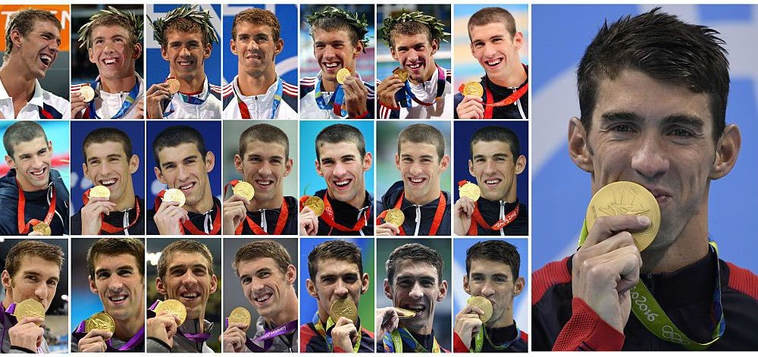
Michael Fred Phelps II (born June 30, 1985) is an American former competitive swimmer and the most decorated Olympian of all time, with a total of 28 medals.
Phelps also holds the all-time records for Olympic gold medals (23), Olympic gold medals in individual events (13), and Olympic medals in individual events (16).
In winning eight gold medals at the 2008 Beijing Games, Phelps broke fellow American swimmer Mark Spitz's 1972 record of seven first-place finishes at any single Olympic Games.
At the 2012 Summer Olympics in London, Phelps won four gold and two silver medals, and at the 2016 Summer Olympics in Rio de Janeiro, he won five gold medals and one silver. This made him the most successful athlete of the Games for the fourth Olympics in a row.
Phelps is the long course world record holder in the 100 meter butterfly, 200 meter butterfly, and 400 meter individual medley as well as the former long course world record holder in the 200 meter freestyle and 200 meter individual medley.
He has won 83 medals in major international long course competition, of which 66 gold were, 14 silver, and 3 bronze, spanning the Olympics, the World, and the Pan Pacific Championships.
Phelps's international titles and record-breaking performances have earned him the World Swimmer of the Year Award eight times and American Swimmer of the Year Award eleven times as well as the FINA Swimmer of the Year Award in 2012 and 2016.
His unprecedented Olympic success in 2008 earned Phelps Sports Illustrated magazine's Sportsman of the Year award.
After the 2008 Summer Olympics, Phelps started the Michael Phelps Foundation, which focuses on growing the sport of swimming and promoting healthier lifestyles. Phelps retired following the 2012 Olympics, but in April 2014 he made a comeback. At the 2016 Summer Olympics in Rio de Janeiro, his fifth Olympics, he won five golds and one silver. Phelps was chosen to be a captain of the 2016 US Olympic team, and was also voted by his team to be the flag bearer of the United States at the 2016 Summer Olympics Parade of Nations.
Click on any of the following blue hyperlinks for more about Michael Phelps:
Phelps also holds the all-time records for Olympic gold medals (23), Olympic gold medals in individual events (13), and Olympic medals in individual events (16).
In winning eight gold medals at the 2008 Beijing Games, Phelps broke fellow American swimmer Mark Spitz's 1972 record of seven first-place finishes at any single Olympic Games.
At the 2012 Summer Olympics in London, Phelps won four gold and two silver medals, and at the 2016 Summer Olympics in Rio de Janeiro, he won five gold medals and one silver. This made him the most successful athlete of the Games for the fourth Olympics in a row.
Phelps is the long course world record holder in the 100 meter butterfly, 200 meter butterfly, and 400 meter individual medley as well as the former long course world record holder in the 200 meter freestyle and 200 meter individual medley.
He has won 83 medals in major international long course competition, of which 66 gold were, 14 silver, and 3 bronze, spanning the Olympics, the World, and the Pan Pacific Championships.
Phelps's international titles and record-breaking performances have earned him the World Swimmer of the Year Award eight times and American Swimmer of the Year Award eleven times as well as the FINA Swimmer of the Year Award in 2012 and 2016.
His unprecedented Olympic success in 2008 earned Phelps Sports Illustrated magazine's Sportsman of the Year award.
After the 2008 Summer Olympics, Phelps started the Michael Phelps Foundation, which focuses on growing the sport of swimming and promoting healthier lifestyles. Phelps retired following the 2012 Olympics, but in April 2014 he made a comeback. At the 2016 Summer Olympics in Rio de Janeiro, his fifth Olympics, he won five golds and one silver. Phelps was chosen to be a captain of the 2016 US Olympic team, and was also voted by his team to be the flag bearer of the United States at the 2016 Summer Olympics Parade of Nations.
Click on any of the following blue hyperlinks for more about Michael Phelps:
- Early life
- Career
- 2000 Summer Olympics
- 2001 World championships
- 2002 Pan Pacific championships
- 2003 World championships
- 2004 Summer Olympics
- 2005 World championships
- 2006 Pan Pacific championships
- 2007 World championships
- 2008 Summer Olympics
- 2009 World championships
- 2010 Pan Pacific championships
- 2011 World championships
- 2012 Summer Olympics
- First retirement
- 2014 comeback from retirement
- 2015 US Nationals
- 2016 Summer Olympics
- Physique
- Testing for performance-enhancing drugs
- Coach Bob Bowman
- Personal life
- Controversies
- Philanthropy
- Honors and awards
- Results in international long-course competition
- Career best times
- World records
- See also:
- List of multiple Olympic gold medalists
- List of multiple Olympic gold medalists at a single Games
- List of multiple Olympic medalists
- List of multiple Olympic medalists at a single Games
- List of multiple Olympic gold medalists in one event
- List of top Olympic gold medalists in swimming
- List of top World Aquatics Championships gold medalists
- List of individual gold medalists in swimming at the Olympics and World Aquatics Championships (men)
- World record progression 100 metres butterfly
- World record progression 200 metres butterfly
- World record progression 200 metres freestyle
- World record progression 200 metres individual medley
- World record progression 400 metres individual medley
- World record progression 4 × 100 metres freestyle relay
- World record progression 4 × 200 metres freestyle relay
- World record progression 4 × 100 metres medley relay
Simone Biles (Gymnast)
- YouTube Video: Simone Biles nails two signature moves at gymnastics world championships
- YouTube Video: Simone Biles Stuns With New Triple Double on Floor | Champions Series Presented By Xfinity
- YouTube Video: Simone Biles breaks gymnastics worlds medals record, gets 5 golds this week
Simone Arianne Biles (born March 14, 1997) is an American artistic gymnast. With a total of 30 Olympic and World Championship medals, Biles is the most decorated American gymnast and the world's third most decorated gymnast, behind Belarus' Vitaly Scherbo (33 medals) and Russia's Larisa Latynina (32 medals).
At the 2016 Summer Olympics in Rio de Janeiro, Biles won individual gold medals in all-around, vault and floor; bronze in balance beam; and gold as part of the United States team, dubbed the "Final Five".
Biles is a five-time World all-around champion (2013–2015, 2018–19), five-time World floor exercise champion (2013–2015, 2018–19), three-time World balance beam champion (2014–15, 2019), two-time World vault champion (2018–19), a six-time United States national all-around champion (2013–2016, 2018–19), and a member of the gold-medal-winning American teams at the 2014, 2015, 2018, and 2019 World Artistic Gymnastics Championships.
Additionally, she is a three-time World silver medalist (2013 and 2014 on vault, 2018 on uneven bars) and a three-time World bronze medalist (2015 on vault, 2013 and 2018 on balance beam).
Biles is the gymnast with the most World medals (25) and most World gold medals (19), having surpassed Scherbo's record 23 World medals by winning her 24th and 25th, both gold, at the 2019 competition in Stuttgart. She is the female gymnast with the most World all-around titles (5).
Biles is the sixth woman to win an individual all-around title at both the World Championships and the Olympics, and the first gymnast since Lilia Podkopayeva in 1996 to hold both titles simultaneously. She is the tenth gymnast and first American gymnast to win a World medal on every event, and the first gymnast since Daniela Silivaș in 1988 to win a medal on every event at a single Olympic Games or World Championships, having accomplished this feat at the 2018 World Championships.
Olympic Champion Mary Lou Retton called Biles the "greatest gymnast ever"; other observers have echoed the sentiment.
Click on any of the following blue hyperlinks for more about Simone Biles:
At the 2016 Summer Olympics in Rio de Janeiro, Biles won individual gold medals in all-around, vault and floor; bronze in balance beam; and gold as part of the United States team, dubbed the "Final Five".
Biles is a five-time World all-around champion (2013–2015, 2018–19), five-time World floor exercise champion (2013–2015, 2018–19), three-time World balance beam champion (2014–15, 2019), two-time World vault champion (2018–19), a six-time United States national all-around champion (2013–2016, 2018–19), and a member of the gold-medal-winning American teams at the 2014, 2015, 2018, and 2019 World Artistic Gymnastics Championships.
Additionally, she is a three-time World silver medalist (2013 and 2014 on vault, 2018 on uneven bars) and a three-time World bronze medalist (2015 on vault, 2013 and 2018 on balance beam).
Biles is the gymnast with the most World medals (25) and most World gold medals (19), having surpassed Scherbo's record 23 World medals by winning her 24th and 25th, both gold, at the 2019 competition in Stuttgart. She is the female gymnast with the most World all-around titles (5).
Biles is the sixth woman to win an individual all-around title at both the World Championships and the Olympics, and the first gymnast since Lilia Podkopayeva in 1996 to hold both titles simultaneously. She is the tenth gymnast and first American gymnast to win a World medal on every event, and the first gymnast since Daniela Silivaș in 1988 to win a medal on every event at a single Olympic Games or World Championships, having accomplished this feat at the 2018 World Championships.
Olympic Champion Mary Lou Retton called Biles the "greatest gymnast ever"; other observers have echoed the sentiment.
Click on any of the following blue hyperlinks for more about Simone Biles:
- Gymnastics career
- Awards
- Sponsors and endorsements
- Personal life
- Skills
- Competitive history
- See also:
- Official website
- Simone Biles at the International Gymnastics Federation
- Simone Biles at USA Gymnastics
- Simone Biles on Twitter
- Biles (floor exercise) at g-flash.net
- List of top female medalists at the World Artistic Gymnastics Championships
- Final Five – the gold medal winning team at the 2016 Summer Olympics
- Me Too (hashtag)
Paralympic Games
- YouTube Video of Highlights from the Rio 2016 Paralympic Games
- YouTube Video: Top 10 Moments of 2012 in Paralympic Sport
- YouTube Video: Swimming Men's 100m Backstroke - S6 Final - London 2012 Paralympic Games
The Paralympic Games or Paralympics are a periodic series of international multi-sport events involving athletes with a range of disabilities, including impaired muscle power (e.g.: paraplegia and quadriplegia, muscular dystrophy, post-polio syndrome, spina bifida), impaired passive range of movement, limb deficiency (e.g. amputation or dysmelia), leg length difference, short stature, hypertonia, ataxia, athetosis, vision impairment and intellectual impairment.
There are Winter and Summer Paralympic Games, which since the 1988 Summer Olympics in Seoul, South Korea, are held almost immediately following the respective Olympic Games. All Paralympic Games are governed by the International Paralympic Committee (IPC).
The Paralympics has grown from a small gathering of British World War II veterans in 1948 to become one of the largest international sporting events by the early 21st century. The Paralympics has grown from 400 athletes with a disability from 23 countries in 1960 to thousands of competitors from over 100 countries at the 2012 Summer Olympics.
Paralympians strive for equal treatment with non-disabled Olympic athletes, but there is a large funding gap between Olympic and Paralympic athletes.
The Paralympic Games are organized in parallel with the Olympic Games, while the IOC-recognized Special Olympics World Games include athletes with intellectual disabilities, and the Deaflympics include deaf athletes.
Given the wide variety of disabilities that Paralympic athletes have, there are several categories in which the athletes compete. The allowable disabilities are broken down into ten eligible impairment types.
The categories are impaired muscle power, impaired passive range of movement, limb deficiency, leg length difference, short stature, hypertonia, ataxia, athetosis, vision impairment and intellectual impairment. These categories are further broken down into classifications, which vary from sport to sport.
Click on any of the following blue hyperlinks for more about The Paralympic Games:
There are Winter and Summer Paralympic Games, which since the 1988 Summer Olympics in Seoul, South Korea, are held almost immediately following the respective Olympic Games. All Paralympic Games are governed by the International Paralympic Committee (IPC).
The Paralympics has grown from a small gathering of British World War II veterans in 1948 to become one of the largest international sporting events by the early 21st century. The Paralympics has grown from 400 athletes with a disability from 23 countries in 1960 to thousands of competitors from over 100 countries at the 2012 Summer Olympics.
Paralympians strive for equal treatment with non-disabled Olympic athletes, but there is a large funding gap between Olympic and Paralympic athletes.
The Paralympic Games are organized in parallel with the Olympic Games, while the IOC-recognized Special Olympics World Games include athletes with intellectual disabilities, and the Deaflympics include deaf athletes.
Given the wide variety of disabilities that Paralympic athletes have, there are several categories in which the athletes compete. The allowable disabilities are broken down into ten eligible impairment types.
The categories are impaired muscle power, impaired passive range of movement, limb deficiency, leg length difference, short stature, hypertonia, ataxia, athetosis, vision impairment and intellectual impairment. These categories are further broken down into classifications, which vary from sport to sport.
Click on any of the following blue hyperlinks for more about The Paralympic Games:
- Forerunners
- Milestones
- Winter Games
- International Paralympic Committee
- Name and symbols
- Ceremonies
- Equality
- Classification
- Sports
- Cheating
- Notable champions and achievements
- Host cities
- See also:
United States at the Olympics including Summer Olympics and Winter Olympics
- YouTube Video: Top 10 Olympic Opening Ceremonies (WatchMojo)
- YouTube Video: Top 10 Inspirational Moments From The Olympics (WatchMojo)
- YouTube Video: Top 5 Olympic Games Affected By Politics (WatchMojo)
The United States at the Olympics:
The United States of America (USA) has sent athletes to every celebration of the modern Olympic Games with the exception of the 1980 Summer Olympics, during which it led a boycott to protest the Soviet invasion of Afghanistan.
The United States Olympic & Paralympic Committee (USOPC) is the National Olympic Committee for the United States.
American athletes have won a total of 2,523 medals (1,022 of them gold) at the Summer Olympic Games and another 305 (105 of them gold) at the Winter Olympic Games, making the United States the most prolific medal-winning nation in the history of the Olympics.
The US is ranked first in the all-time medal table even if all the incarnations of Russia and Germany are combined, leading the second-placed Russians by 402 gold and 917 total medals. These achievements are even more impressive considering the fact that the American Olympic team remains the only in the world to receive no government funding.
Click on any of the following blue hyperlinks for more about the United States Olympic Games:
The United States at the Summer Olympics:
The United States of America has sent athletes to every celebration of the modern Summer Olympic Games with the exception of the 1980 Summer Olympics, during which it led a boycott.
The United States Olympic & Paralympic Committee (USOPC) is the National Olympic Committee for the United States.
Click on any of the following blue hyperlinks for more about the United States at the Summer Olympics: ___________________________________________________________________________
The United States at the Winter Olympics:
The United States of America has sent athletes to every celebration of the Winter Olympic Games. The United States Olympic & Paralympic Committee (USOPC) is the National Olympic Committee for the United States.
Click on any of the following blue hyperlinks for more about the United States at the Winter Olympics:
The United States of America (USA) has sent athletes to every celebration of the modern Olympic Games with the exception of the 1980 Summer Olympics, during which it led a boycott to protest the Soviet invasion of Afghanistan.
The United States Olympic & Paralympic Committee (USOPC) is the National Olympic Committee for the United States.
American athletes have won a total of 2,523 medals (1,022 of them gold) at the Summer Olympic Games and another 305 (105 of them gold) at the Winter Olympic Games, making the United States the most prolific medal-winning nation in the history of the Olympics.
The US is ranked first in the all-time medal table even if all the incarnations of Russia and Germany are combined, leading the second-placed Russians by 402 gold and 917 total medals. These achievements are even more impressive considering the fact that the American Olympic team remains the only in the world to receive no government funding.
Click on any of the following blue hyperlinks for more about the United States Olympic Games:
- Hosted Games
- Medal tables
- Flagbearers
- History
- Amateurism and professionalism
- Russia–United States rivalry
- See also:
- "United States of America". International Olympic Committee.
- "Results and Medalists—United States". Olympic.org. International Olympic Committee.
- "Olympic Medal Winners". International Olympic Committee.
The United States at the Summer Olympics:
The United States of America has sent athletes to every celebration of the modern Summer Olympic Games with the exception of the 1980 Summer Olympics, during which it led a boycott.
The United States Olympic & Paralympic Committee (USOPC) is the National Olympic Committee for the United States.
Click on any of the following blue hyperlinks for more about the United States at the Summer Olympics: ___________________________________________________________________________
The United States at the Winter Olympics:
The United States of America has sent athletes to every celebration of the Winter Olympic Games. The United States Olympic & Paralympic Committee (USOPC) is the National Olympic Committee for the United States.
Click on any of the following blue hyperlinks for more about the United States at the Winter Olympics:
Miracle on Ice (1980 Winter Olympics)
- YouTube Video of the 1980 Miracle on Ice Highlights
- YouTube Video: 1980 Olympic Hockey USA vs USSR
- YouTube Video: The Miracle on Ice, 35 Years Later
The "Miracle on Ice" was an ice hockey game during the 1980 Winter Olympics in Lake Placid, New York. It was played between the hosting United States and the Soviet Union on February 22, 1980, during the medal round of the men's hockey tournament. Though the Soviet Union was a four-time defending gold medalist and heavily favored, the United States upset them and won 4–3.
The Soviet Union had won the gold medal in five of the six previous Winter Olympic Games, and they were the favorites to win once more in Lake Placid. The team consisted primarily of veteran players with significant experience in international play.
By contrast, none of the young players on the United States' team, led by head coach Herb Brooks, had any National Hockey League experience, and largely came from college hockey ranks. With only four players with minimal professional experience, the United States was the youngest team in the tournament and in U.S. national team history. In the group stage, both the Soviet and U.S. teams were unbeaten; the U.S. achieved surprising results, including a 2–2 draw against Sweden, and a 7–3 upset victory over second-place favorite Czechoslovakia.
For the first game in the medal round, the United States played the Soviets. Finishing the first period tied at 2–2, and the Soviets leading 3–2 following the second, the U.S. team scored two more goals to take their first lead midway in the third and final period, then held on and won 4–3.
Two days later, the U.S. won the gold medal by beating Finland in their final game. The Soviet Union took the silver medal by beating Sweden.
The victory became one of the most iconic moments of the Games and in U.S. sports. Equally well-known was the television call of the final seconds of the game by Al Michaels for ABC, in which he declared: "Do you believe in miracles? YES!"
In 1999, Sports Illustrated named the "Miracle on Ice" the top sports moment of the 20th century. As part of its centennial celebration in 2008, the International Ice Hockey Federation (IIHF) named the "Miracle on Ice" as the best international ice hockey story of the past 100 years.
Click on any of the following blue hyperlinks for more about "The Miracle on Ice:
The Soviet Union had won the gold medal in five of the six previous Winter Olympic Games, and they were the favorites to win once more in Lake Placid. The team consisted primarily of veteran players with significant experience in international play.
By contrast, none of the young players on the United States' team, led by head coach Herb Brooks, had any National Hockey League experience, and largely came from college hockey ranks. With only four players with minimal professional experience, the United States was the youngest team in the tournament and in U.S. national team history. In the group stage, both the Soviet and U.S. teams were unbeaten; the U.S. achieved surprising results, including a 2–2 draw against Sweden, and a 7–3 upset victory over second-place favorite Czechoslovakia.
For the first game in the medal round, the United States played the Soviets. Finishing the first period tied at 2–2, and the Soviets leading 3–2 following the second, the U.S. team scored two more goals to take their first lead midway in the third and final period, then held on and won 4–3.
Two days later, the U.S. won the gold medal by beating Finland in their final game. The Soviet Union took the silver medal by beating Sweden.
The victory became one of the most iconic moments of the Games and in U.S. sports. Equally well-known was the television call of the final seconds of the game by Al Michaels for ABC, in which he declared: "Do you believe in miracles? YES!"
In 1999, Sports Illustrated named the "Miracle on Ice" the top sports moment of the 20th century. As part of its centennial celebration in 2008, the International Ice Hockey Federation (IIHF) named the "Miracle on Ice" as the best international ice hockey story of the past 100 years.
Click on any of the following blue hyperlinks for more about "The Miracle on Ice:
- History
- Game summary
- American aftermath
- Soviet aftermath
- Notable rematches
- Popular culture
- Team rosters
- Box score
- See also:
- Eskenazi, Gerald (February 23, 1980). "U.S. Defeats Soviet Squad In Olympic Hockey by 4–3". The New York Times.
- Kindred, Dave (February 23, 1980). "Born to Be Players, Born to the Moment". Washington Post.
- Shapiro, Leonard (February 23, 1980). "U.S. Shocks Soviets in Ice Hockey, 4–3". Washington Post.
- Miracle on Ice team to reunite for the 35 year anniversary
Mary Lou Retton, Olympic Gymnast at the 1984 Summer Olympics
Mary Lou Retton (born January 24, 1968) is a retired American gymnast. At the 1984 Summer Olympics (see below) in Los Angeles, she won a gold medal in the individual all-around competition, as well as two silver medals and two bronze medals. Her performance made her one of the most popular athletes in the United States.
Her gold medal was a historic win because Retton was the first American woman to win the all-around gold medal at the Olympics.
Click on any of the following blue hyperlinks for more about Mary Lou Retton:
1984 Summer Olympics
The 1984 Summer Olympics (officially known as the Games of the XXIII Olympiad and commonly known as Los Angeles 1984) was an international multi-sport event held from July 28 to August 12, 1984, mainly in Los Angeles, California, United States. It marked the second time that Los Angeles had hosted the Games, the first being in 1932.
California was the home state of the incumbent U.S. President, Ronald Reagan, who officially opened the Games. The emblem of the 1984 Games, known as "Stars in Motion", featured red, white and blue stars arranged horizontally and struck through with alternating streaks, and the official mascot was Sam the Olympic Eagle. These were the first Summer Olympic Games under the IOC presidency of Juan Antonio Samaranch.
The 1984 Games were boycotted by a total of fourteen Eastern Bloc countries, including the Soviet Union and East Germany, in response to the American-led boycott of the 1980 Summer Olympics in Moscow in protest of the Soviet invasion of Afghanistan; Romania was the only Eastern Bloc nation that opted to attend the Games. Iran and Libya also chose to boycott the Games for unrelated reasons.
Despite the field being depleted in certain sports due to the boycott, 140 National Olympic Committees took part, a record number at the time. The United States won the most gold and overall medals, followed by West Germany and Romania.
The 1984 Summer Olympics are widely considered to be the most financially successful modern Olympic Games, serving as an example of how to run the model Olympics. As a result of low construction costs, coupled with a reliance on private corporate funding, the 1984 Games generated a profit of over $250 million.
On July 18, 2009, a 25th anniversary celebration of the 1984 Olympic Games was held at the Los Angeles Memorial Coliseum. The celebration included a speech by former Los Angeles Olympic Organizing Committee president Peter Ueberroth, as well as a re-enactment of the lighting of the Olympic cauldron. Los Angeles will host the Summer Olympics for the third time in 2028.
Click on any of the following blue hyperlinks for more about the 1984 Summer Olympic Games:
Her gold medal was a historic win because Retton was the first American woman to win the all-around gold medal at the Olympics.
Click on any of the following blue hyperlinks for more about Mary Lou Retton:
- Personal life
- Gymnastics career
- Post-gymnastics career
- Film and TV appearances
- Medical conditions
- Gymnastics legacy
- See also:
- Official website
- Where Are They Now?: Mary Lou Retton Photos & Info
- Mary Lou RETTON at the International Gymnastics Federation
- Mary Lou Retton on IMDb
- List of competitive results at Gymn Forum
- Mary Lou Retton 2007 Interview with Béla Károlyi on Sidewalks Entertainment
- List of Olympic female gymnasts for the United States
- List of Olympic medal leaders in women's gymnastics
1984 Summer Olympics
The 1984 Summer Olympics (officially known as the Games of the XXIII Olympiad and commonly known as Los Angeles 1984) was an international multi-sport event held from July 28 to August 12, 1984, mainly in Los Angeles, California, United States. It marked the second time that Los Angeles had hosted the Games, the first being in 1932.
California was the home state of the incumbent U.S. President, Ronald Reagan, who officially opened the Games. The emblem of the 1984 Games, known as "Stars in Motion", featured red, white and blue stars arranged horizontally and struck through with alternating streaks, and the official mascot was Sam the Olympic Eagle. These were the first Summer Olympic Games under the IOC presidency of Juan Antonio Samaranch.
The 1984 Games were boycotted by a total of fourteen Eastern Bloc countries, including the Soviet Union and East Germany, in response to the American-led boycott of the 1980 Summer Olympics in Moscow in protest of the Soviet invasion of Afghanistan; Romania was the only Eastern Bloc nation that opted to attend the Games. Iran and Libya also chose to boycott the Games for unrelated reasons.
Despite the field being depleted in certain sports due to the boycott, 140 National Olympic Committees took part, a record number at the time. The United States won the most gold and overall medals, followed by West Germany and Romania.
The 1984 Summer Olympics are widely considered to be the most financially successful modern Olympic Games, serving as an example of how to run the model Olympics. As a result of low construction costs, coupled with a reliance on private corporate funding, the 1984 Games generated a profit of over $250 million.
On July 18, 2009, a 25th anniversary celebration of the 1984 Olympic Games was held at the Los Angeles Memorial Coliseum. The celebration included a speech by former Los Angeles Olympic Organizing Committee president Peter Ueberroth, as well as a re-enactment of the lighting of the Olympic cauldron. Los Angeles will host the Summer Olympics for the third time in 2028.
Click on any of the following blue hyperlinks for more about the 1984 Summer Olympic Games:
- Host selection
- Torch relay
- Music
- Highlights
- Venues
- Medals awarded
- Calendar
- Medal count
- Participating National Olympic Committees
- Boycotting countries
- Financial success of Los Angeles as host city
- In popular culture
- See also:
- 1984 Summer Paralympics
- 1984 Winter Paralympics
- 1984 Winter Olympics: see previous topic.
- Olympic Games celebrated in the United States
- 1904 Summer Olympics – St. Louis
- 1932 Summer Olympics – Los Angeles
- 1932 Winter Olympics – Lake Placid
- 1960 Winter Olympics – Squaw Valley
- 1980 Winter Olympics – Lake Placid
- 1984 Summer Olympics – Los Angeles
- 1996 Summer Olympics – Atlanta
- 2002 Winter Olympics – Salt Lake City
- 2028 Summer Olympics – Los Angeles
- Olympic Games with significant boycotts
- 1976 Summer Olympics – Montreal – African boycott
- 1980 Summer Olympics – Moscow – United States-led boycott
- 1984 Summer Olympics – Los Angeles – Soviet-led boycott
- Summer Olympic Games
- Olympic Games
- International Olympic Committee
- List of IOC country codes
- Use of performance-enhancing drugs in the Olympic Games — 1984 Los Angeles
- "Los Angeles 1984". Olympic.org. International Olympic Committee.
- Video of President Reagan declaring games open, and torch-lighting by Rafer Johnson on YouTube
2020 Summer Olympics in Tokyo, Japan
- YouTube Video: USA Defeats France! Wins Gold Medal 2020 Tokyo Olympics!
- YouTube Video: Team USA wins heat in rowing women's eight | Tokyo Olympics | NBC Sports
- YouTube Video: Simone Biles' stunning floor routine at Tokyo 2020 podium training | NBC Sports
The 2020 Summer Olympics (Japanese: 2020年夏季オリンピック, Hepburn: Nisen Nijū-nen Kaki Orinpikku), officially the Games of the XXXII Olympiad (第三十二回オリンピック競技大会, Dai Sanjūni-kai Orinpikku Kyōgi Taikai) and branded as Tokyo 2020 (東京2020), was an international multi-sport event held from 23 July to 8 August 2021 in Tokyo, Japan, with some preliminary events that began on 21 July.
Tokyo was selected as the host city during the 125th IOC Session in Buenos Aires, Argentina, on 7 September 2013. Originally scheduled to take place from 24 July to 9 August 2020, the event was postponed to 2021 in March 2020 as a result of the COVID-19 pandemic, the first such instance in the history of the Olympic Games (previous games had been cancelled but not rescheduled).
However, the event retained the Tokyo 2020 name for marketing and branding purposes. It was largely held behind closed doors with no public spectators permitted due to the declaration of a state of emergency in the Greater Tokyo Area in response to the pandemic.
The Summer Paralympics will be held between 24 August and 5 September 2021, 16 days after the completion of the Olympics.
The 2020 Games were the fourth Olympic Games to be held in Japan, following the Tokyo 1964 (Summer), Sapporo 1972 (Winter) and Nagano 1998 (Winter) games. Tokyo was the first city in Asia to hold the Summer Games twice. The 2020 Games were the second of three consecutive Olympics to be held in East Asia, following the 2018 Winter Olympics in Pyeongchang, South Korea and preceding the 2022 Winter Olympics in Beijing, China.
New events were introduced in existing sports for 2020, including 3x3 basketball, freestyle BMX and mixed gender team events in a number of existing sports, as well as the return of madison cycling for men and an introduction of the same event for women. New IOC policies also allowed the host organizing committee to add new sports to the Olympic program for just one Games.
The disciplines added by the Japanese Olympic Committee were baseball and softball, karate, sport climbing, surfing and skateboarding, the last four of which made their Olympic debuts.
The United States topped the medal count by both total golds (39) and total medals (113), with China finishing second by both respects (38 and 88). Host nation Japan finished third, setting a record for the most gold medals and total medals ever won by their delegation at an Olympic Games with 27 and 58.
Great Britain finished fourth, with a total of 22 gold and 65 medals, becoming the first nation at the Summer Olympics to increase or equal their total medals won in the two Games subsequent to hosting them. The Russian delegation competing as the ROC finished fifth with 20 gold medals and third in the overall medal count, with 71 medals.
Bermuda, the Philippines and Qatar won their first-ever Olympic gold medals. Burkina Faso, San Marino and Turkmenistan won their first-ever Olympic medals.
Click on any of the following blue hyperlinks for more about the 2020 Summer Olympics:
Tokyo was selected as the host city during the 125th IOC Session in Buenos Aires, Argentina, on 7 September 2013. Originally scheduled to take place from 24 July to 9 August 2020, the event was postponed to 2021 in March 2020 as a result of the COVID-19 pandemic, the first such instance in the history of the Olympic Games (previous games had been cancelled but not rescheduled).
However, the event retained the Tokyo 2020 name for marketing and branding purposes. It was largely held behind closed doors with no public spectators permitted due to the declaration of a state of emergency in the Greater Tokyo Area in response to the pandemic.
The Summer Paralympics will be held between 24 August and 5 September 2021, 16 days after the completion of the Olympics.
The 2020 Games were the fourth Olympic Games to be held in Japan, following the Tokyo 1964 (Summer), Sapporo 1972 (Winter) and Nagano 1998 (Winter) games. Tokyo was the first city in Asia to hold the Summer Games twice. The 2020 Games were the second of three consecutive Olympics to be held in East Asia, following the 2018 Winter Olympics in Pyeongchang, South Korea and preceding the 2022 Winter Olympics in Beijing, China.
New events were introduced in existing sports for 2020, including 3x3 basketball, freestyle BMX and mixed gender team events in a number of existing sports, as well as the return of madison cycling for men and an introduction of the same event for women. New IOC policies also allowed the host organizing committee to add new sports to the Olympic program for just one Games.
The disciplines added by the Japanese Olympic Committee were baseball and softball, karate, sport climbing, surfing and skateboarding, the last four of which made their Olympic debuts.
The United States topped the medal count by both total golds (39) and total medals (113), with China finishing second by both respects (38 and 88). Host nation Japan finished third, setting a record for the most gold medals and total medals ever won by their delegation at an Olympic Games with 27 and 58.
Great Britain finished fourth, with a total of 22 gold and 65 medals, becoming the first nation at the Summer Olympics to increase or equal their total medals won in the two Games subsequent to hosting them. The Russian delegation competing as the ROC finished fifth with 20 gold medals and third in the overall medal count, with 71 medals.
Bermuda, the Philippines and Qatar won their first-ever Olympic gold medals. Burkina Faso, San Marino and Turkmenistan won their first-ever Olympic medals.
Click on any of the following blue hyperlinks for more about the 2020 Summer Olympics:
- Bidding process
- Impact of the COVID-19 pandemic
- Development and preparation
- The Games
- Medal summary
- Calendar
- Marketing
- Concerns and controversies
- Broadcasting
- See also:
- 2020 Summer Paralympics
- Olympic Games celebrated in Japan:
- 1964 Summer Olympics – Tokyo
- 1972 Winter Olympics – Sapporo
- 1998 Winter Olympics – Nagano
- 2020 Summer Olympics – Tokyo
- List of IOC country codes
- Tokyo 2020 Olympic Games official website
- Japanese Olympic Committee
